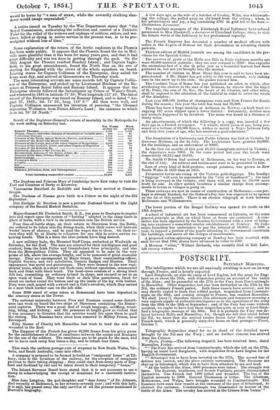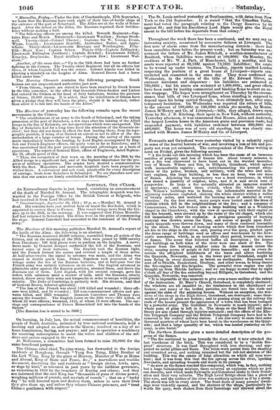POSTSCRIPT.
SATURDAY Mco-nva.
The intelligence which we are all anxiously awaiting is now on its way through France, and is hourly expected.
Lord Burghersh, an Aide-de-camp of Lord Raglan, left the army for Eng- land on or about the 25th, with despatches giving an account of the battle of the Alma ; and he proceeded on the 27th in the Fury from Constantinople to Marseilles. Other despatches had also been forwarded on the 25th by the Nil, the ordinary French packet. Both these vessels have arrived ; and we may shortly expect to learn that a third packet, despatched from Constanti- nople on the 30th, and coming straight to France, has reached Marseilles. We shall [may?] therefore receive this afternoon and tomorrow morning a very copious supply of authentic intelligence as to the operations of the army from the 20th to the 28th of September ; and, if the Fury had come without accident, we ought to have had these despatches quite as soon as Lord Stmt- ford'a telegraphic message of the 30th. But it is probable the Fury was de- layed between Malta and Marseilles; for, though she left that island before the Nil, we know that she arrived twelve hours later than the ordinary French mail, which is generally sixty-five hours on that passage.—Times, October 7.
Telegraphic despatches stand for us in stead of the detailed news brought by the Nil and the Fury ; and no further rumour has arrived from the Crimea.
" Paris, Friday.—The following despatch has been received here, dated Marseilles, Friday. " The Fury has arrived from Constantinople, which she left on the 27th, having on board Lord Burghersh, with despatches from Lord Raglan for the English Government.
" Sebastopol was to have been invested on the 27th. The second line of defence was carried, and the place entirely surrounded. The Russians are shut up in Sebastopol, which was to have been attacked by sea and land. " At the battle of the Alma, 3000 prisoners were taken. The struggle was fierce. The Zouaves, tirailleurs, and Scotch Fusiliers, greatly distinguished themselves. The French lost 1400 killed and wounded. The loss of the English amounts to 2000. General Thomasson is better. The Albatross, Montezuma, and Wolga, have brought wounded to Constantinople. The Russians have sunk four vessels at the entrance of the port of Sebastopol, to obstruct the entrance. Constantinople was illuminated in honour of the battle of the Alma. The cavalry has arrived in the Crimea from Varna.'"
"Marseilles, Friday.--Under the date of Constantinople, 27th September, we learn that the Russians have sunk eight of their line-of-battle ships at the entrance of the port of Sebastopol. The Allies are at the walls of Sebas- topol. After the defeat on the Alma, the Russians regained their fortifica- tions without making a halt.
"The following officers are among the killed. Seventh Regiment—Cap- tains Hare and Monck. Nineteenth—Lieutenant Wardlaw ; Ensign Stock- well. Twenty-third—Colonel Chester ; Captains Sir W. Young, Evans, Wynn, Conolly ; Lieutenants P.adcliffe, Anstruthet, Butler, and Apple- whiiite. Thirty-third—Lieutenants Montagu and Worthington. Fifty- fifth—Major Rose ; Captain Schaw. Ninety-fifth—Captain Eddington ; lieutenant Eddington (brothers); Captain Dowdall ; Lieutenants Polhill, Kingsley, Braybrooke. Royal Artillery—Captain Dew ; Lieutenant Wal- sham." Another, of the same date.—" Up to the 24th there had been no further fighting in the Crimea. The Twenty-third Regiment lost all its officers but three, of whom Captain Bell was the senior. Colonel Ainslie was killed in planting a standard on the heights of Alma. General Brown had a horse killed under him."
The Morning Chronicle contains the following paragraph. Greek houses are not unquestioned authorities just now. " From Odessa, reports are stated to have been received by Greek houses in the City yesterday, to the effect that Generals Osten-Sacken and Liiders bad entered the Crimea at the head of forty battalions, besides the garrison of Odessa, 20,000 strong. It is added, that the inhabitants of Odessa have given a pledge that they will burn the place, should it be attacked, rather than allow it to fall into the hands of the Allies."
The Moniteur of yesterday has the following remarks upon the recent movements in the Crimea.
" The establishment of an army to the South of Sebastopol, and the taking possession of the port of Balaclava, a few days after the landing of the Allied troops in the Bay of Kelamita, are not operations which were unexpected. The Bay of Balaclava had for a long time fixed the attention of the Generals-in- chief ;. but they did not desire to effect the first landing there, from its topo- graphic position, it being of so limited an extent as not to allow of the dis- embarkation of a large number of troops. During the survey of the coasts made immediately before the landing, by Lord Raglan accompanied by Eng- lish and French Engineer officers, the party rent as far as Balaclava; • and it . was ascertained that the port presented important advantages as a basis of operations. The report of General Bizet, officer of Engineers, dated Septem- ber 18, affords proot of this.
" Thus, the occupation of that town on the morning of the 28th by'the Allied troops is n significant fact, and of the highest importance for the pro- gress of military operations. The armies have insured a communication with the fleet. Magazines and moveable hospitals have been properly in- stalled there. A convenient and safe road, practicable for every description of carriage, leads from Balaclava to Sebastopol. We are therefore now cer- tain that our armies are firmly established in the Crimea."



































 Previous page
Previous page